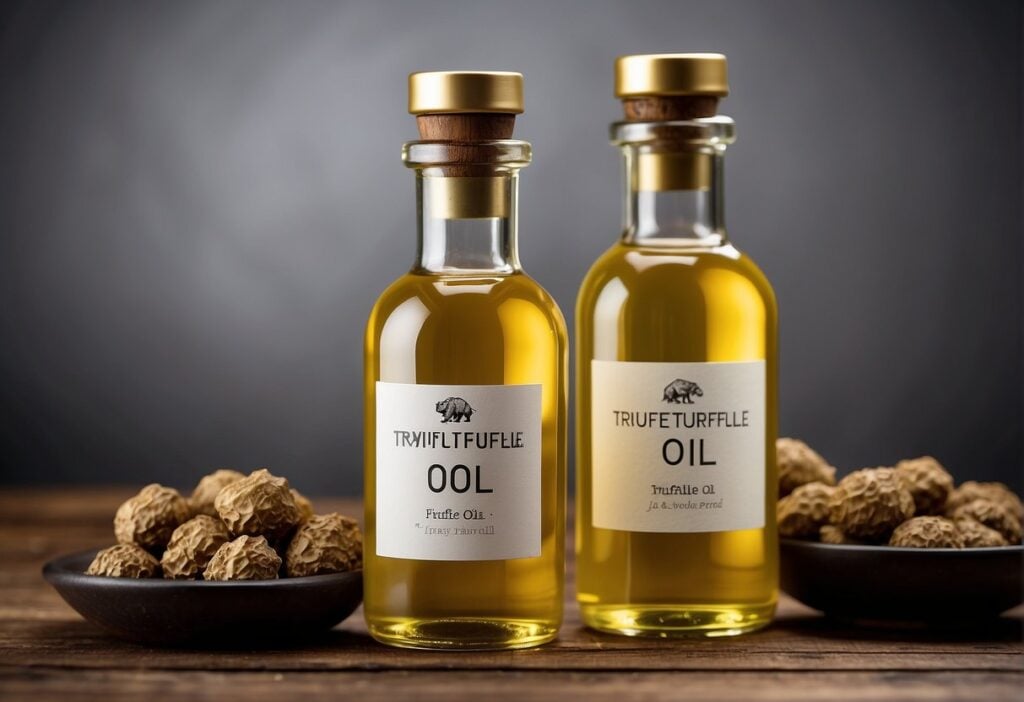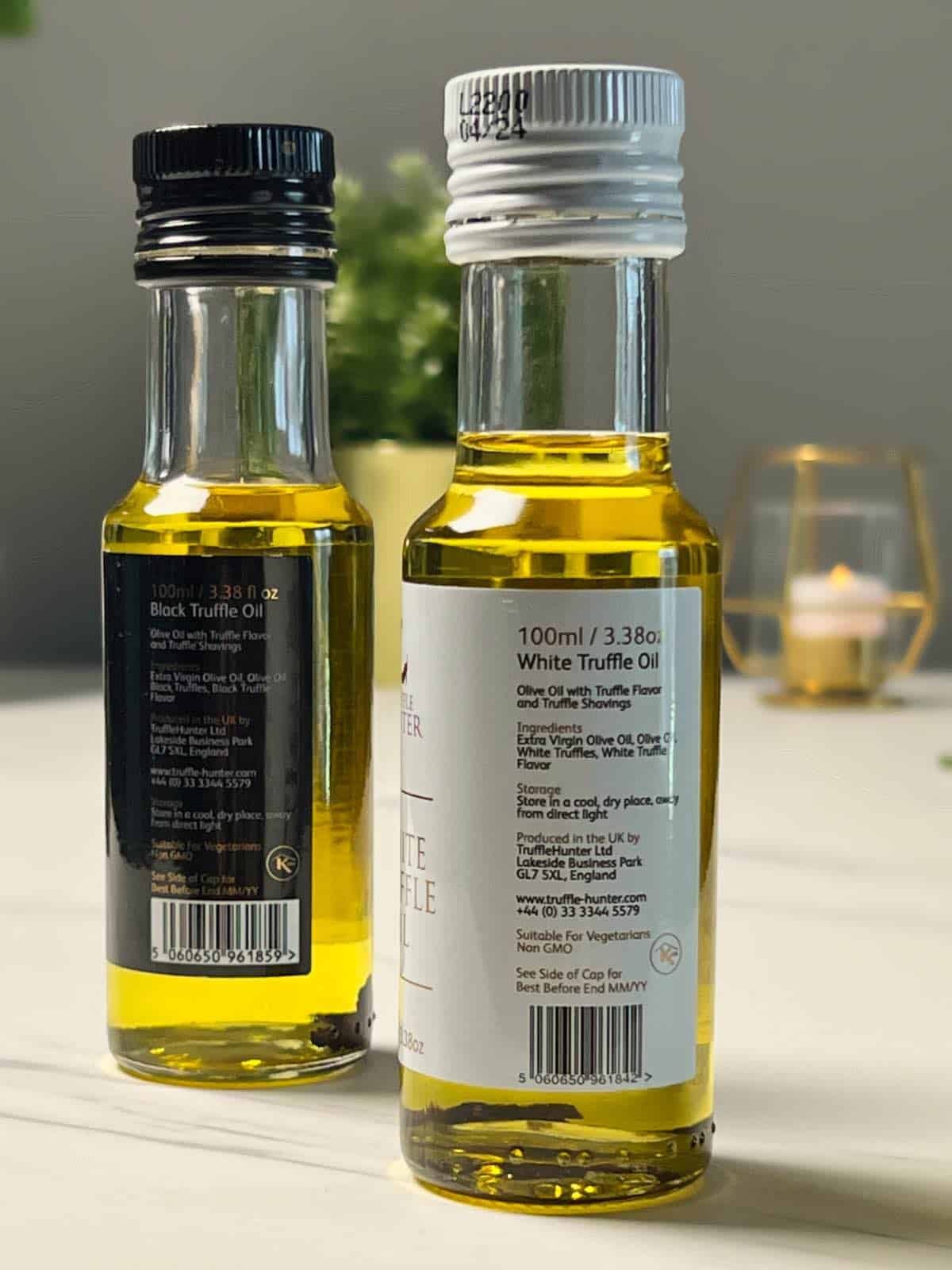
Introduction
Truffle oil is a popular culinary ingredient that is derived from truffles, a type of rare and highly prized mushroom. It is highly aromatic and has a distinct, earthy flavor that adds a touch of luxury to any dish. Truffle oil is available in various forms, including black truffle oil, white truffle oil, and even infused truffle oils with additional flavors like garlic or mushroom.
Overview Of Truffle Oil And Its Variations
Truffle oil comes in different variations, each with its own unique characteristics. The most common types are black truffle oil and white truffle oil:
- Black truffle oil: Made from black truffles, this oil has a strong and intense flavor. It is often described as earthy and musky, with hints of garlic or chocolate.
- White truffle oil: Made from white truffles, this oil has a milder and more delicate flavor compared to black truffle oil. It is often described as buttery and nutty, with notes of garlic or mushroom.
Aside from the traditional black and white truffle oils, there are also infused truffle oils available in the market. These oils are made by adding other ingredients, such as garlic or mushroom, to enhance the flavor. Infused truffle oils offer a unique twist and can be used to add additional depth to dishes.
Benefits Of Using Truffle Oil In Cooking
Truffle oil can elevate the flavor profile of a dish and add a touch of sophistication. Some key benefits of using truffle oil in cooking include:
- Intense flavor: Truffle oil has a strong and distinct flavor that can enhance the taste of various dishes. Just a few drops can transform a simple pasta dish or roasted vegetables into a gourmet delight.
- Versatility: Truffle oil can be used in a wide range of dishes, including salads, soups, pasta, risotto, and even desserts. Its versatility allows chefs and home cooks to experiment and create unique and flavorful dishes.
- Cost-effective alternative: Truffle oil is a more affordable option compared to fresh truffles. While fresh truffles can be expensive and difficult to source, truffle oil provides a more accessible way to enjoy their unique flavor.
- Long shelf life: Truffle oil has a relatively long shelf life, allowing it to be stored and used over an extended period. This makes it a convenient ingredient to have in the kitchen pantry.
In summary, truffle oil is a versatile and flavorful ingredient that can enhance the taste of various dishes. Its unique aroma and taste make it a popular choice among chefs and home cooks alike. With its various variations, truffle oil offers a range of flavors to suit different preferences.
What Are Black Truffle And White Truffle?
Truffle oil is a popular culinary ingredient derived from truffles, a rare and highly prized mushroom. There are different variations of truffle oil, with the most common being black truffle oil and white truffle oil.
Characteristics And Flavors Of Black Truffle
Black truffle oil is made from black truffles and has a strong and intense flavor. It is often described as earthy and musky, with hints of garlic or chocolate. The distinct aroma and taste of black truffle oil can elevate the flavor profile of various dishes, adding a touch of sophistication.
Characteristics And Flavors Of White Truffle
White truffle oil, on the other hand, is made from white truffles and has a milder and more delicate flavor compared to black truffle oil. It is often described as buttery and nutty, with notes of garlic or mushroom. The subtle yet luxurious flavor of white truffle oil complements a wide range of dishes, allowing chefs and home cooks to experiment with unique and flavorful creations.
When it comes to truffle oil, there are also infused variations available in the market. These infused truffle oils are made by adding additional ingredients like garlic or mushroom to enhance the flavor. This offers a unique twist and allows for even more flavor experimentation in cooking.
Truffle oil provides several benefits when used in cooking. Its intense flavor can transform simple dishes into gourmet delights. Its versatility allows it to be used in a wide range of recipes, from salads and soups to pasta and risotto. Truffle oil also serves as a cost-effective alternative to fresh truffles, which can be expensive and hard to find. With its relatively long shelf life, truffle oil can be stored and used over an extended period, making it a convenient and practical ingredient to have in the kitchen pantry.
Overall, both black truffle oil and white truffle oil offer unique flavors that can enhance the taste of various dishes. Their distinct characteristics make them popular choices among chefs and home cooks looking to add a touch of luxury to their culinary creations.
The Process Of Making Truffle Oil
Extraction Method For Black Truffle Oil
Black truffle oil is made from black truffles using a process that involves infusing the flavor of the truffles into a neutral oil base. The black truffles are first cleaned and finely chopped. They are then mixed with a high-quality cooking oil, such as olive oil or sunflower oil. The mixture is left to infuse for a period of time, allowing the oil to absorb the intense flavors of the truffles. After the infusion process, the oil is strained to remove any solid particles, resulting in a rich and aromatic black truffle oil.
Extraction Method For White Truffle Oil
The process of making white truffle oil is similar to that of black truffle oil. White truffles are cleaned and finely chopped, and then mixed with a neutral oil base. The mixture is left to infuse, allowing the oil to absorb the delicate flavors of the white truffles. After the infusion period, the oil is strained to remove any solid particles, resulting in a smooth and luxurious white truffle oil.
Truffle oil is a versatile ingredient that can be used in a variety of dishes. Its intense flavor adds depth and complexity to recipes, making it a popular choice among chefs and home cooks. Both black truffle oil and white truffle oil offer unique flavor profiles that can elevate the taste of various dishes. Black truffle oil has a strong and earthy flavor, while white truffle oil has a milder and more buttery taste. Infused variations of truffle oil are also available, offering additional flavors to enhance the culinary experience.
In addition to its flavor benefits, truffle oil also provides a cost-effective alternative to fresh truffles. Fresh truffles can be expensive and difficult to source, while truffle oil offers a more accessible option without compromising on flavor. The long shelf life of truffle oil makes it a convenient and practical ingredient to have in the kitchen.
Overall, truffle oil is a prized culinary ingredient that brings a touch of luxury and sophistication to dishes. Its unique flavors and versatility make it a go-to choice for adding an extra dimension to recipes. Whether it’s black truffle oil or white truffle oil, these oils offer a delectable culinary experience for those seeking to indulge in the flavors of truffles.
Truffle Oil Flavors And Aromas
Distinctive Flavors And Aromas Of Black Truffle Oil
Black truffle oil offers a strong and earthy flavor that adds depth and complexity to dishes. Its distinctive aroma gives a rich and intense experience to the senses. The extraction method for black truffle oil involves infusing the flavor of black truffles into a neutral oil base, such as olive oil or sunflower oil. This process allows the oil to absorb the intense flavors of the truffles, resulting in a rich and aromatic oil. Black truffle oil is known for its strong and earthy taste, making it the perfect choice to enhance savory dishes like pasta, risottos, or grilled meats.
Distinctive Flavors And Aromas Of White Truffle Oil
White truffle oil offers a milder and more buttery flavor compared to its black counterpart. The delicate flavors of white truffles create a luxurious and smooth taste sensation. The extraction method for white truffle oil is similar to that of black truffle oil, where the truffles are finely chopped and mixed with a neutral oil base. The infusion process allows the oil to absorb the delicate and delicate flavors of the truffles, resulting in a smooth and luxurious oil. White truffle oil is popularly used in dishes like creamy pastas, vegetable risottos, or drizzled over roasted vegetables to add a touch of elegance and sophistication.
Both black truffle oil and white truffle oil offer unique flavor profiles that can elevate the taste of various dishes. Their distinct aromas and flavors make them prized culinary ingredients among chefs and home cooks. Truffle oils also provide a cost-effective alternative to fresh truffles, as they are more readily available and offer a long shelf life. With their versatility and ability to enhance the culinary experience, black and white truffle oils are go-to choices for those seeking to indulge in the flavors of truffles.

Culinary Uses Of Black Truffle Oil
Enhancing Dishes With Black Truffle Oil
Black truffle oil is a widely used ingredient in the culinary world due to its distinctive flavor and aroma. Chefs and home cooks alike rely on this oil to add depth and complexity to their dishes. Here are some ways to incorporate black truffle oil into your cooking:
- Use it as a finishing oil: Drizzle a small amount of black truffle oil over cooked dishes just before serving to enhance their flavors. It works particularly well with pasta, risottos, and grilled meats.
- Infuse it into sauces and dressings: Add a few drops of black truffle oil to sauces like aioli or vinaigrettes to infuse them with its earthy taste. This can elevate the overall flavor profile of dishes like salads or sandwiches.
- Incorporate it into creamy dishes: Black truffle oil pairs wonderfully with creamy dishes like mashed potatoes, soups, or mac and cheese. Its earthy flavor adds a luxurious touch to these comfort foods.
Popular Recipes Using Black Truffle Oil
Black truffle oil can be used in a variety of dishes, from appetizers to main courses. Here are some popular recipes that feature this flavorful oil:
- Truffle oil pasta: Toss cooked pasta with a generous drizzle of black truffle oil, grated Parmesan cheese, and a sprinkle of black pepper for a simple yet decadent meal.
- Truffle mashed potatoes: Prepare mashed potatoes as usual, then stir in a small amount of black truffle oil to infuse them with its earthy flavor. Serve as a side dish to complement roasted meats or poultry.
- Truffle scrambled eggs: Beat eggs with a splash of cream, then cook them in a pan with a bit of butter. Just before they’re fully cooked, drizzle some black truffle oil over the eggs and stir gently to distribute the flavors evenly.
In conclusion, black truffle oil offers a strong and earthy flavor that can enhance a wide range of dishes. Its distinctive aroma and taste make it a prized ingredient in the culinary world. Whether used as a finishing oil or incorporated into recipes, black truffle oil adds depth and sophistication to any meal.
Culinary Uses Of White Truffle Oil
Enhancing Dishes With White Truffle Oil
White truffle oil is a versatile ingredient that is highly sought after in the culinary world. Its unique flavor and aroma can greatly enhance a variety of dishes. Here are some ways to incorporate white truffle oil into your cooking:
- Use it as a finishing oil: Just like black truffle oil, white truffle oil can be drizzled over cooked dishes right before serving to add a burst of flavor. It pairs well with pasta, risottos, and grilled meats.
- Infuse it into sauces and dressings: Add a few drops of white truffle oil to sauces and dressings, such as aioli or vinaigrettes, to give them a distinctive earthy taste. This can elevate the overall flavor of salads or sandwiches.
- Incorporate it into creamy dishes: Similar to black truffle oil, white truffle oil complements creamy dishes like mashed potatoes, soups, or mac and cheese. Its unique flavor adds a touch of luxury to these comfort foods.
Popular Recipes Using White Truffle Oil
White truffle oil can be used in a variety of delicious recipes. Here are a few popular ones that showcase the flavor of white truffle oil:
- Truffle oil pasta: Toss cooked pasta with a generous drizzle of white truffle oil, grated Parmesan cheese, and a sprinkle of black pepper for a simple yet indulgent meal.
- Truffle mashed potatoes: Prepare mashed potatoes as usual, then stir in a small amount of white truffle oil to infuse them with its earthy flavor. Serve as a side dish to complement roasted meats or poultry.
- Truffle scrambled eggs: Beat eggs with a splash of cream, then cook them in a pan with a bit of butter. Just before they’re fully cooked, drizzle some white truffle oil over the eggs and gently stir to distribute the flavors evenly.
In summary, white truffle oil is a prized ingredient that can enhance a wide range of dishes. Whether used as a finishing oil or incorporated into recipes, its unique flavor and aroma add depth and sophistication to any meal.
Black Truffle Oil Vs White Truffle Oil: Similarities
Similarities In Flavor Profiles And Culinary Applications
When it comes to truffle oils, both black truffle oil and white truffle oil share some similarities in their flavor profiles and culinary applications. Here are a few commonalities:
- Distinctive earthy flavor: Both black truffle oil and white truffle oil have a distinctive earthy flavor that can elevate the taste of various dishes. This earthiness is often described as nutty, mushroom-like, and slightly garlicky.
- Finishing oil: Both types of truffle oil can be used as finishing oils, meaning they are added to dishes just before serving to enhance the flavors. They are commonly drizzled over pasta, risottos, grilled meats, or even salads to add a burst of truffle essence.
- Versatile ingredient: Both black truffle oil and white truffle oil can be used in a wide range of recipes. They can be infused into sauces, dressings, and creamy dishes, adding depth and complexity to the overall flavor profile.
Common Misconceptions About Black And White Truffle Oil
There are some common misconceptions about black truffle oil and white truffle oil that it is important to address:
| Black Truffle Oil | White Truffle Oil |
|---|---|
| It is made from black truffles. | It is made from white truffles. |
| Its flavor is more intense and earthy. | Its flavor is more delicate and garlicky. |
| It is generally more expensive. | It is often more affordable. |
It is important to note that both black and white truffle oils are typically made by infusing olive oil with truffle essence, rather than being extracted directly from the truffles themselves. This allows for a more affordable and accessible alternative to using fresh truffles in cooking.
In conclusion, both black truffle oil and white truffle oil offer unique flavors and can enhance a wide variety of dishes. Understanding their similarities and differences can help you choose the right one for your culinary creations. So go ahead and experiment with these luxurious ingredients to elevate your meals to the next level.

Black Truffle Oil Vs White Truffle Oil: Differences
Differences In Taste, Aroma, And Intensity
When comparing black truffle oil and white truffle oil, there are distinct differences in their taste, aroma, and intensity:
- Black Truffle Oil: Made from black truffles, this oil has a more intense and earthy flavor. It is often described as robust, musky, and earthy, with hints of chocolate and nuts. The aroma is powerful and can fill a room with its rich fragrance.
- White Truffle Oil: Made from white truffles, this oil has a more delicate and garlicky flavor. It is known for its subtle, yet complex taste, with notes of garlic, shallots, and even a hint of sweet onion. The aroma is lighter compared to black truffle oil, but still distinctive and enticing.
Choosing The Right Truffle Oil For Your Dish
When it comes to choosing between black truffle oil and white truffle oil for your dish, consider the following:
- Intensity: If you prefer a bolder truffle flavor, opt for black truffle oil. It works well with heartier dishes like red meat, mushroom-based dishes, and rich sauces. On the other hand, if you prefer a more delicate truffle flavor, white truffle oil is a better choice. It complements lighter dishes like pasta, seafood, and creamy sauces.
- Price: Black truffle oil is generally more expensive due to the scarcity and higher demand for black truffles. If budget is a concern, white truffle oil is often more affordable while still offering a delightful truffle essence.
- Culinary Applications: Both black truffle oil and white truffle oil can be used as finishing oils, but they also lend themselves well to different culinary applications. Black truffle oil pairs well with earthy dishes, while white truffle oil adds a touch of elegance to more delicate flavors.
In conclusion, the differences between black truffle oil and white truffle oil lie in their taste, aroma, intensity, and culinary applications. Understanding these differences can help you make the right choice for your dishes and elevate your culinary creations to new heights.
Conclusion And Recommendations
Final Thoughts On Black Truffle Oil Vs White Truffle Oil
When it comes to black truffle oil and white truffle oil, the differences in taste, aroma, and intensity make them suitable for different culinary applications. Black truffle oil offers a robust and musky flavor, perfect for heartier dishes like red meat and mushroom-based dishes. On the other hand, white truffle oil has a more delicate and garlicky flavor, which complements lighter dishes like pasta, seafood, and creamy sauces. The choice between the two ultimately depends on personal preference and the desired intensity of truffle flavor in your dish.
Tips For Incorporating Truffle Oil Into Your Cooking
Here are some tips for using truffle oil in your cooking:
- Use truffle oil as a finishing touch: Truffle oil is best used as a finishing oil to preserve its delicate flavors. Drizzle a small amount over your dish just before serving to enhance the taste and aroma.
- Start with a small amount: Truffle oil is potent, so a little goes a long way. Start with a small amount and gradually add more if desired. It’s better to add less and adjust to taste rather than overpowering your dish with too much truffle flavor.
- Pair truffle oil with complementary ingredients: Truffle oil pairs well with ingredients that complement its flavor profile. Experiment with using it in dishes that feature mushrooms, garlic, onions, creamy sauces, or delicate flavors like pasta and seafood.
- Store truffle oil properly: To prolong the shelf life and maintain the quality of your truffle oil, store it in a cool, dark place away from direct sunlight. Make sure to tightly seal the bottle after each use to prevent oxidation.
Incorporating truffle oil into your cooking can elevate your dishes and add a touch of luxury. Whether you choose black truffle oil or white truffle oil, these culinary gems are sure to enhance your culinary creations and impress your guests. So go ahead, explore the world of truffle oil and let your creativity shine in the kitchen!
FAQ: Black Truffle Oil vs White: Exploring Truffle Flavor Varieties
Q: What is the difference between black truffle oil and white truffle oil?
A: The main difference lies in the type of truffle used to make the oil. Black truffle oil is infused with black truffles, while white truffle oil uses white truffles. This distinction gives each oil its own distinct flavor profile.
Q: How do the flavors of black truffle oil and white truffle oil differ?
A: Black truffle oil has a robust and earthy flavor with notes of mushroom and garlic. It is often described as slightly nuttier and can be quite intense. On the other hand, white truffle oil has a more delicate and subtle flavor profile. It is often described as garlicky, with hints of shallots and even a touch of sweetness.
Q: Can black truffle oil be used as a substitute for white truffle oil, and vice versa?
A: While both oils offer a truffle flavor, they have distinct differences in taste. Black truffle oil tends to be more pungent and flavorful, making it a great choice for dishes that need a stronger truffle presence. White truffle oil, with its milder taste, works well when you want to add a subtle truffle note without overpowering the dish. Substituting one for the other may affect the overall flavor of the recipe, so it’s best to choose the oil that complements the other ingredients.
Q: Are there any specific dishes that black truffle oil or white truffle oil pair particularly well with?
A: Black truffle oil pairs excellently with savory dishes like risottos, pasta, mashed potatoes, and even grilled meats. Its robust flavor can hold up well in these hearty dishes. White truffle oil, on the other hand, is often used in more delicate preparations. It complements dishes like creamy pasta, seafood, eggs, and cheese beautifully, adding a touch of elegance.
Q: Are there any considerations when using truffle oil in cooking?
A: Truffle oil is best used as a finishing touch, drizzled lightly over dishes just before serving. Heat can diminish the delicate flavors, so it’s generally not recommended for cooking at high temperatures. Additionally, truffle oils can vary in quality, so it’s important to choose a reputable brand that uses authentic truffle extract. Always check the ingredients list to ensure that the oil is made with real truffle extract and not just synthetic flavoring.
Q: How should I store truffle oil to maintain its flavor?
A: Truffle oil should be stored in a cool, dark place, away from direct sunlight and heat. When exposed to excessive light and warmth, the flavors can deteriorate. It is best to keep the oil tightly closed when not in use to prevent oxidation. With proper storage, truffle oil can retain its flavors for several months.
In summary, black truffle oil and white truffle oil offer distinct flavor profiles, with black truffle oil being more robust and intense, while white truffle oil is delicate and subtle. Each oil has its own range of culinary uses, and it’s important to choose the right oil that complements your dish. Remember to store truffle oil properly to maintain its quality and enjoy its unique flavors to the fullest.

At Yuan Food, we take pride in bringing the authentic flavors of Chinese cuisine to the heart of Plano, Texas. Located at 2049 Coit Rd, our restaurant has been a beloved culinary destination since our establishment. Our story begins with a deep-rooted passion for sharing the rich culinary heritage of China with the local community. Drawing inspiration from time-honored recipes and culinary traditions, we have curated a menu that showcases the diverse and vibrant tapestry of Chinese gastronomy.